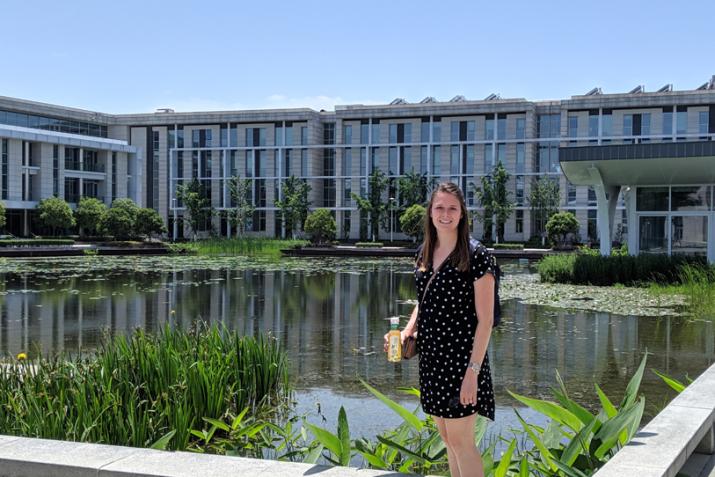
Christine Crute stands in front of Duke Kunshan University in Kunshan, Jiangsu, China. In-between fieldwork and lab processing, she and her team stopped here for a few days to meet with collaborating faculty. This beautiful campus hosts experts in both global health and environmental policy, many of whom greatly contributed to their current and future project planning.
Published August 5, 2019, last updated on April 7, 2020 under Voices of DGHI
Every summer, global health students at Duke University travel to over 30 countries around the world to do field research in a variety of topics within global health—including environmental health, mental health, infectious disease, health policy and more.
DGHI caught up with Christine Crute, a PhD student in Duke's integrated program in environmental health and toxicology, to learn more about her field research in China with a Bass Connections team led by Dr. Liping Feng, assistant professor of obstetrics and gynecology. Crute and her team are studying the health effects of the electronic waste recycling industry on pregnant mothers and their children who live near these sites through investigating chemical exposure, conducting community surveys and analyzing cord blood samples.
The team has worked in three locations to conduct this project, including Taizhou, Zhejiang, the main research site. At Duke Kunshan University in Kunshan, Jiangsu, Crute’s team hosted planning meetings with University faculty, and in Shanghai, Jiangsu, they worked at the Laboratory of Children’s Environmental Health at Xinhua Hospital to process biological samples from the e-waste children’s cohort and design experiments to measure child health outcomes from those exposures.
DGHI: What inspired you to pursue THIS project?
Crute: I am passionate about research that addresses environmental exposures and human health, specifically in developing children and communities facing health inequality. This project combines all of these interests into one project to understand the specific health effects on developing children during pregnancy.
What I find particularly important about this project is that there are no immediate solutions, and in fact, the problem is increasing. As electronics become more and more a part of our daily lives and people must keep up with the most updated versions of these products, e-waste recycling will continue to grow around the world. I am interested in understanding how that will affect many disadvantaged populations and how we can protect these communities.
DGHI: What aspect of your fieldwork are you most excited about?
Crute: I am so excited that my fieldwork is connected to my lab work. As a toxicologist-in-training, I could spend all my time in the lab studying how chemicals interact with our cells and how these interactions lead to disease. Although I find that type of work fascinating, I love seeing the connection between my cell experiments and the humans I am trying to help. Seeing the real-world application of my research through fieldwork boosts my passion for environmental health sciences.
DGHI: What’s the best piece of advice you got when preparing for your fieldwork?
Crute: “It doesn’t have to be perfect” is not a statement that I am used to agreeing with when planning my laboratory experiments. But, preparing for fieldwork is a whole different task, and my perfectionist nature was having a difficult time understanding that fieldwork comes with a lot of unknowns. Unlike my perfectly controlled cellular experiments, much of fieldwork takes adjusting the plan as you go, improvising and doing the best with what you’ve got.

